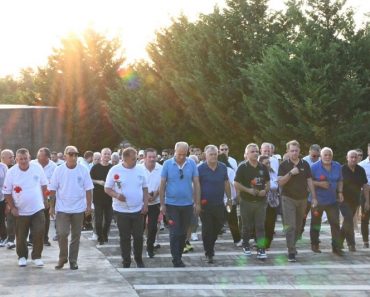Across the world, second-generation Greek Gen-Zers are consuming language, music and media as a means to remain connected with their cultural heritage and families. Trying to speak the Greek language is hard, but probably the best way to remain close to their Greek roots, teenagers from the United States and the UK say.
“My parents used to take me to the annual Greek parade to connect me with my Greek roots. I loved going so much because it’s such a vibrant scene and it really made me feel like a part of the Greek community even though I was across the globe,” said Thalia Anastas, a 17-year-old from New York City.
It is common for Greek immigrant parents to send their children to Greek Sunday schools to be immersed in the culture and get connected to the Greek community abroad. While Greek is often also spoken in their homes, many Greek children that live abroad find it difficult to have one foot in each world, and can often forget to remain close to their heritage. Ruth Hill Useem, an American sociologist and anthropologist, coined the term “Third Culture Kid” to describe this conflicting experience.
Although many second-generation Greeks are taught the language in some capacity, communicating with grandparents and relatives who don’t speak other languages can be difficult. For those that were distanced from the culture, these interactions are very isolating. On the other hand, those that are in touch with their roots express a great deal of pride in their heritage.
“Learning the Greek language has been incredibly rewarding, especially when I visit every year, because it connected me to such a rich history at such a young age,” Anastas said.
Learning Greek offers children more than a sense of culture. Experts note that learning a second language at an early age helps the brain develop and makes it more cognitively flexible. Greek, with its entirely unique alphabet and historical wealth, offers special mental benefits over languages that are closely related to each other like English, French and Spanish.
Greek is a Category IV language for speakers of Germanic languages – the second most difficult to learn. The alphabet contains letters such as ρ (rho), μ (mi), and ν (ni), which look familiar to letters in Germanic languages but are pronounced completely differently and often confuse beginners.
Even after decades of practice, many second-generation Greeks find that they’re still not fluent in Greek, as they have never been fully immersed in the country’s mindset, exposed to colloquialisms and slang, or experienced living in the complete cultural context. Full fluency for second-generation Greeks is slowly fleeting.
“Learning Greek as a kid was super difficult, especially for me, because I didn’t have the help of structured classes or the constant exposure that other kids had,” said Michael Goneos, a 16-year-old from Westchester.
Amid the challenges, the reward is significant. For young people of Greek heritage, fluency – or even semi-fluency – more deeply connects them to Greece, increases their appreciation for family customs, and provides a sense of belonging that bridges their worlds.
“I’ve always loved being able to practice my Greek with anyone who will listen. It just makes me feel so proud that I can connect and communicate with so many people in my community,” Leonidas Zarifi, a 16-year-old from London, said.
Daria Sitinas is an intern at Kathimerini English Edition and a student at the Chapin School in New York.







